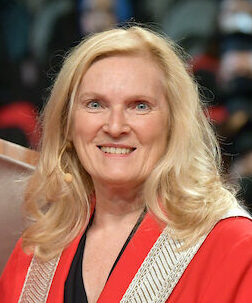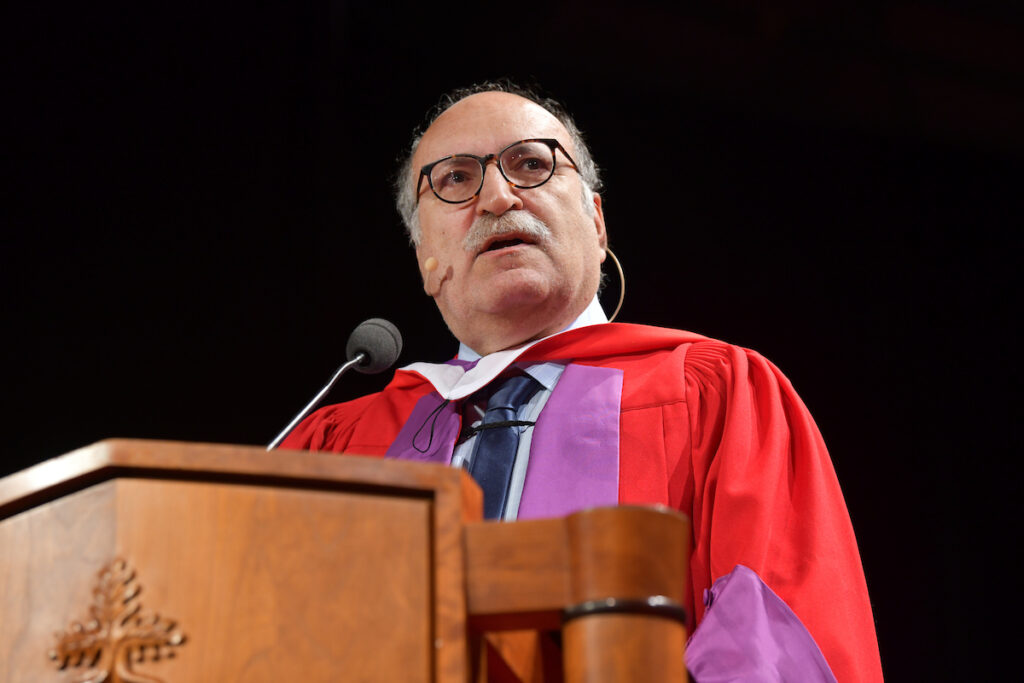
By Ashley Goodfellow Craig
Think about how you can change the world, York University’s graduating psychology students, from the Faculty of Health, heard from honorary degree recipient Dr. Steven Stein during the convocation ceremony held June 13.
Stein, a clinical psychologist, former Chair of the Psychology Foundation of Canada, a current Fellow of the Canadian Psychological Association and former instructor teaching Personality and Abnormal Psychology courses in York’s Psychology department from 1982-92, received an honorary doctor of laws.
With expertise in psychological assessment and emotional intelligence, Stein has become a prominent consultant and commentator on the field of psychology and shared with graduands the pillars of his career choices, which led to his success with his company Multi-Health Systems. It is an organization focused on psychology and psychological principles and has positively influenced the lives of tens of millions of people around the world.

Remarking on York University as an “excellent training ground for psychology and other health related disciplines,” he urged the Class of 2022 to consider the “four Ps” – passion, pivot, positivity and purpose – as they move forward in their studies and their careers.
He shared the moment he discovered a passion for psychology at age 13 when he picked up his older brother’s copy of Freud’s General Introduction to Psychoanalysis and couldn’t put it down.
“I stayed up all night captivated by it. I then read Freud’s Interpretation of Dreams and followed up with other of his writings. Now, I’ve moved on from that school of thought long ago, but it was the passion of the concepts that stays with me,” he said.
This led to an undergrad, a master’s and a doctorate in psychology, during which time he learned that psychology could go beyond theory and academia and can have a positive impact on the world.
“This only increased my passion,” he said, adding that now, many of his peers in other professions have retired or are close to retirement, but his own passion for psychology persists. “It was the passion of psychology and the different areas it influences that has driven me along this path. My advice to you is to find something in your chosen career that you can be passionate about.”
Being open to change and opportunity is also key to success, and within that, the ability to pivot. The world today is changing more rapidly than ever before, he said, and we don't really know where our career interests can lead us. The whole nature of work is shifting, so be open to new directions and don’t be afraid to pivot.
The third “P” is positivity, and something that is often overlooked in the field of psychology, he said. In his own career in the early 90s as a clinical psychologist, he was investigating ways to start measuring positive attributes and the strengths that differentiate people who do well in life.
“At that time all of our assessments focused on the traditional disorders in psychology – depression, anxiety, attention deficit disorder, and so on – the negatives. I had been looking for a way to start measuring positive attributes, those things that were instrumental in peoples’ life successes.”
He partnered with psychologist Reuven Bar-On, and together they pioneered and published a tool to measure emotional intelligence.
“Focusing on positive attributes can be very rewarding and impactful,” he said.
Which leads to the fourth “P” – purpose.
“It’s really important to aim for something that’s bigger than yourself. Ideally something that benefits others – whether in your community, your country, or the world. Innocently, I aimed for the world. Amazingly I believe I’m succeeding.”
Psychology has enabled him to have experiences working with or impacting programs that include some of the most in need in our communities, people with severe mental health challenges, homeless women, serious multiple offenders, victims of offenders, and people struggling through poverty.
“I had no idea of how limitless psychology could be. Psychology touches everything about being human,” said Stein. “So, as you start the next stage of your life, your career, keep in mind these four Ps. Think of how you can apply passion, pivot, positivity, and purpose to change the world and make it a better place.”
